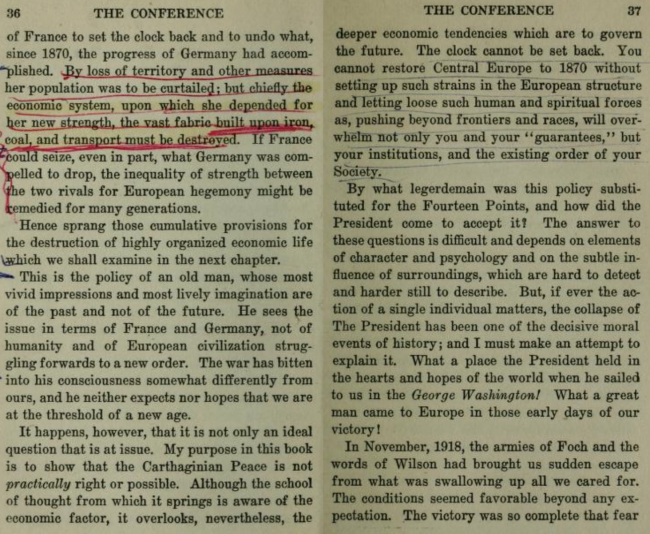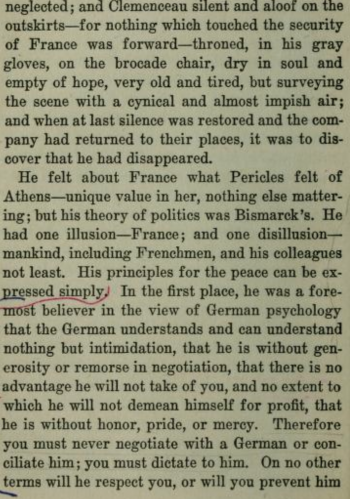Keynes - The economic consequences of the Peace
Introduction
The Economic Consequences of the Peace (1919) is a book written and published by the British economist John Maynard Keynes. In his book, he argued for a much more generous peace, not out of a desire for justice or fairness – these are aspects of the peace that Keynes does not deal with – but for the sake of the economic well-being of all of Europe, including the Allied Powers, which the Treaty of Versailles and its associated treaties would prevent.
Archive.org
The book can be read on the Internet on the Website Archive.org [1].
Reviews
Wikipedia
The English Wikipedia has a review-article [2].
Excerpts
Clemanceau
Woodrow Wilson
The president of the USA:
[I]f ever the action of a single individual matters, the collapse of The President has been one of the decisive moral events of history. ... He had no plan, no scheme, no constructive ideas whatever for clothing with the flesh of life the commandments which he had thundered from the White House. ... [N]ot only was he ill-informed, but his mind was slow and unadaptable ... There can seldom have been a statesman of the first rank more incompetent than the President in the agilities of the council chamber."
David Lloyd George
The British Prime Minister.
"[he had an] unerring, almost medium-like sensibility to every one around him ... watching the company, with six or seven senses not available to ordinary men, judging character, motive, and subconscious impulse, perceiving what each [man] was thinking and even what each was going to say next, and compounding with telepathic instinct the argument or appeal that best suited the vanity, weakness, or self-interest of his auditor..."
Lost of Land
 |
Importance of Keynes (Wikipedia)
Keynes was a highly influential advisor to the British government during the Second World War. He was head of the British team that negotiated the Bretton Woods Agreement with the American team led by Harry Dexter White. In general, the Agreement suggested a monetary system similar to that proposed by Keynes in The Economic Consequences of the Peace.
His proposal for an International Clearing Union formed the basis of proposals for the International Monetary Fund and the International Bank for Reconstruction and Development – later the World Bank and Bank for International Settlements. However, the operation of these institutions was not as liberal as Keynes would have wished.
Keynes was also responsible for negotiating financial support for Britain during the Second World War. While Britain struggled to afford the terms offered during the war, the credit offered by the US was much more generous. Furthermore, the Western powers did not ask for reparations from the defeated powers, although the Soviet Union forced reparations from East Germany, which it controlled.
In 1948 the United States initiated the Marshall Plan of aid to assist in the rebuilding of Europe, Allies and Axis countries alike – except for the Soviet Union, which refused to participate, and its Eastern European satellites, which were blocked from receiving aid by the Soviets. The Plan was in many ways similar to what Keynes had proposed at Versailles after World War I. As Keynes predicted, reparations and war debts were paid for by loans from the US, leaving no one better off.
The postwar system led to one of the greatest general increases in prosperity in human history. From 1948 to 1971, world trade increased by an average annual rate of 7.27% and industrial production grew by an average of 5.6%. That contrasts with the interwar period where world trade actually fell in the 1930s, and world industrial production grew fitfully in the 1920s and was hit by the Great Depression.
See also
Reference
- ↑ Archive.org, The Economic Consequences of the Peace, John Maynard Keynes.
- ↑ Wikipedia, Review page The Economic Consequences of the Peace.
